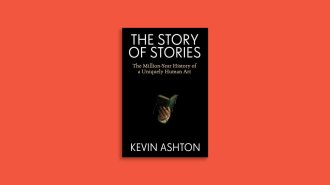Deliberate ignorance is useful in certain circumstances, researchers say
Choosing not to know can be a way to reclaim lost power, a study suggests

The former East German secret police, the Stasi, spied on people for years. But when given access to what the Stasi had supposedly collected, most people didn’t want to read the files, researchers found.
ADAM BERRY/AFP via Getty Images
In 1961, renowned German novelist Günter Grass openly criticized communist East Germany for building the Berlin Wall ostensibly to prevent West Germans from infiltrating the country. In reality, the wall was more effective at preventing East Germans from defecting.
From that point on, East German secret police known as the Stasi shadowed Grass, a West German who frequently visited his neighbors to the East. In their notes, the Stasi refer to Grass with the code name “Bolzen,” or Bolt. When Germany was reunited in 1990, the Stasi’s file on Bolzen contained over 1,200 pages.
While extreme, Grass’ case was not unique. For 40 years, the Stasi wiretapped homes, bugged phones and encouraged people to come forward with information about potential government dissenters. Today, the Stasi Records Archives, housed throughout Germany, are so vast that if measured end to end, they would span 111 kilometers.
Following the reunification of Germany, government leaders made those records public. They assumed that most people living in former East Germany would want to find out if a file on them existed and, if so, read it. Knowledge, it was widely believed, would help people reclaim their life stories.
The East German regime controlled so many aspects of people’s lives, says cognitive psychologist and decision scientist Ralph Hertwig of the Max Planck Institute for Human Development in Berlin. Officials could decide whether someone in the country could go to university, or get a person fired from their job without explanation. They could arrest people in stealth so that their loved ones had no way of knowing where they had gone. Why would people not want to know what prompted such decisions or, perhaps, who betrayed them?
“At first glance, it seems there are many good reasons to want to find out,” Hertwig says.
That sentiment aligns with the conventional wisdom that knowledge tends to be always beneficial or desirable, say Hertwig and others. But that’s not what he and historian Dagmar Ellerbrock of the Technische Universität Dresden in Germany learned.
More people did not read their files than read them, the researchers found in an unpublished survey of over 2,300 residents of former East Germany. In a new paper, the team surveyed 134 former East Germans who opted out of reading their files to better understand their rationale. That survey, along with in-depth interviews with another 22 participants, revealed that people deliberately, rather than passively, chose ignorance, the scientists reported in the December Cognition.
The finding aligns with other research showing that, under certain conditions, deliberate ignorance about certain matters also has merit.
‘A veil of ignorance’ can be useful
Imagine having to create a society from scratch, but with a hitch. You know nothing about yourself — such as your gender, economic status, nationality, education level or even appearance. What if you create a patriarchy and find out you’re female, or you block immigration only to find out you are an immigrant yourself? U.S. philosopher John Rawls developed this thought experiment in his 1971 book A Theory of Justice to show how operating behind a “veil of ignorance” could lead to a fairer society.
“The veil of ignorance is the idea that sometimes … knowledge may distract us, may bias us,” Hertwig says.
That thought experiment has played out in various ways in real life. For instance, in a seminal study, economists showed how creating a veil of ignorance around hiring decisions can override human bias. That is, placing music directors behind a shield — a literal veil of ignorance — during auditions led to substantially more women gaining a seat in symphony orchestras, researchers reported in 2000 in the American Economic Review.
In a similar vein, many East Germans chose their own veil of ignorance to protect themselves and others, Hertwig and Ellerbrock’s research suggests.
A survey of the 134 individuals who chose not to view their files revealed that more than 75 percent of participants cited the information as irrelevant because the past couldn’t be changed and thus didn’t need to be revisited. Over half said they did not want to know if their informants included colleagues, family or friends. And roughly 30 percent of respondents doubted their files would even reflect the truth. In effect, by denying the Stasi claim to their story, people stripped the regime of their power.
That appears to have been Grass’ stance. “These Stasi files were like a poison because they were seen as valid documents. What they said had to be true,” Grass once said. “People trusted the statements and did not consider that large parts were exaggerated or even made up.”
Choosing not to know
After the fall of East Germany, officially known as the German Democratic Republic, or GDR, people were given access to the files kept on them by the East German secret police, the Stasi. But many chose not to read them. Researchers surveyed 134 individuals to find out why, offering 15 reasons. Here are the top 10 listed by percentage of individuals who cited each one.
| Top 10 reasons | Percentage of individuals |
|---|---|
| Information not relevant | 78 |
| Possibility of informant among colleagues | 58 |
| Possibility of informant among friends/family | 54 |
| Impact on ability to trust | 44 |
| Bureaucracy | 40 |
| No new information | 39 |
| Wrong to view GDR solely in terms of the Stasi | 38 |
| Impact on perceived ability to judge character | 31 |
| Information not accurate | 30 |
| Way of avoiding difficult decisions | 28 |
Why do people choose ignorance?
The findings enhance a growing body of work by psychologists to understand when and why people choose to seek knowledge or, conversely, to remain ignorant.
In a study posted in January 2020 in Nature Human Behaviour, researchers suggested that people consider three specific questions: How useful is the information? How will the information make me feel? And does the information gel with my world view?
Those questions can help explain people’s decisions not to view their Stasi files, says study coauthor and cognitive neuroscientist Tali Sharot of the University College London. For one, the information was no longer useful or relevant once the East German regime fell. And the information in the files had a high likelihood of containing information that would make people feel bad. Knowing, in other words, felt more harmful than not knowing.
Rob MacCoun, a psychologist and law professor at Stanford University, likens the decision to people deciding not to get genetic testing for diseases with no cure. “Both cases suggest that there are situations in which people intuit that learning something will lead them down a path they don’t want to walk. It is a kind of mental hygiene,” he says, “and maybe there’s some wisdom in that.”
What to do when knowledge is necessary
For Sharot and many researchers studying deliberate ignorance, focusing on situations where ignorance represents a poor choice, rather than a worthy one, is the more pressing area of inquiry.
For instance, when people actively avoid information that might conflict with their view of the world, they can create dangerous echo chambers. “If someone is skeptical of climate change, they may not go out and seek information that suggests climate change is real,” Sharot says. But that ignorance imperils the health of the planet.
Research also shows that 10 percent of people who take an HIV test never come back for the results. Such individuals probably choose ignorance out of fear, but they also put others at risk of contracting the disease, Sharot says.
Tweaking the message, when it comes to medical information, overcomes people’s desire not to know, Sharot’s unpublished work suggests. She and her team wanted to see how to get more people to receive potentially scary information on their predisposition for certain genetic diseases.
One group of study participants was told that the additional information would help them take precautionary measures to ward off a given disease’s onset. Another group received a more neutral message. Those receiving the helpful message were more likely than others to overcome their fears and agree to receive such information.
Hertwig agrees this research is essential. But digging into instances where ignorance makes sense, and no change in behavior is needed, also has important implications, he says. The study of East Germans, for instance, provides clues about how societies handle periods of political upheaval. Across time, societies have had to grapple with how to move on from oppressive regimes. Should the leaders of a new regime make all former leaders and informants atone for their sins? Or should they mostly put the past behind them and move on?
“There is no simple answer to the question,” Hertwig says. What makes sense in one society may not make sense in another.
In the case of the Stasi files, people’s decision to ignore information en masse was a way of taking power away from their former tormentors, Hertwig says, allowing citizens in the reunified Germany to build a new and more peaceful future.







